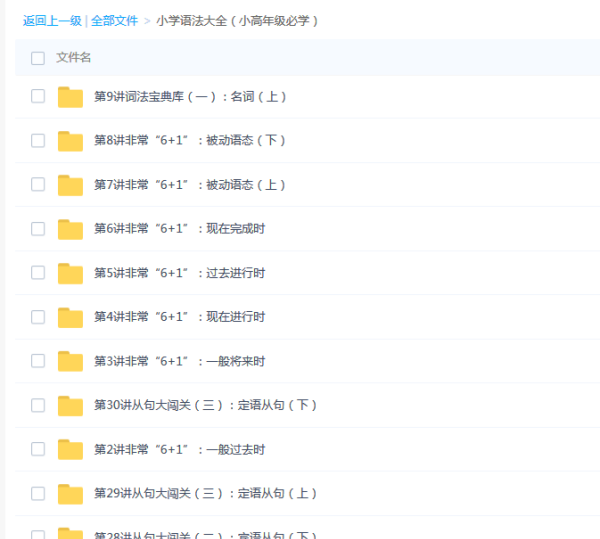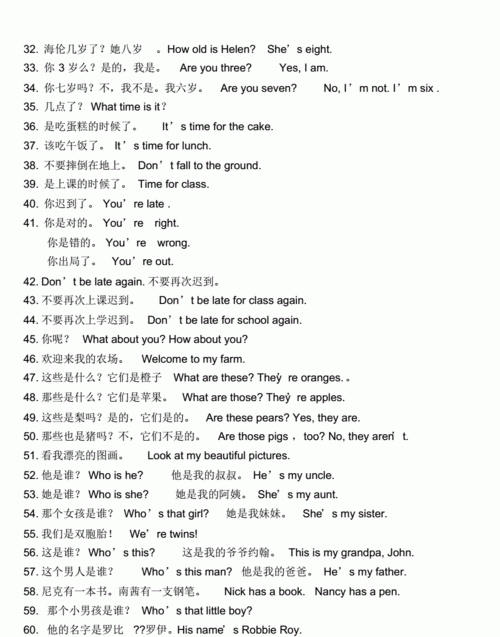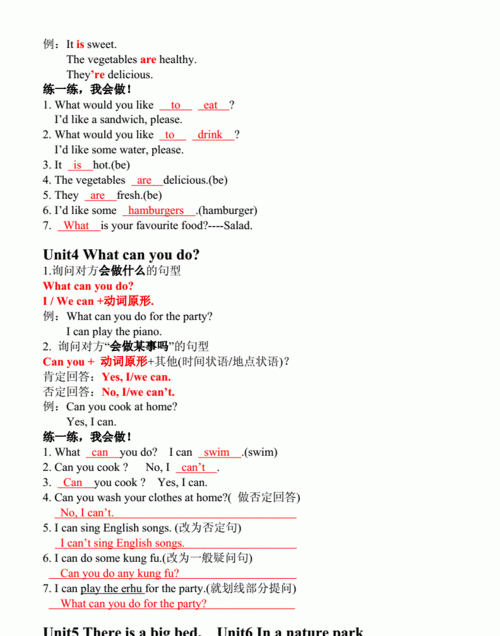本文目录
小学六年级英语语法整理
小学语法大全(小高年级必学)
链接:***/s/1CNQL_9XvupTISemFLsQouA
提取码:n4zc
小学语法大全(小高年级必学)百度网盘

小学英语三年级下册重点句型
小学英语70个必备重点句型
句型的学习对于小学英语来说,是个重点知识,很多小学生都不能很好地去把握句型,其实把握句型很简单的,首先我们要学会背诵,下面我就整理出来了那些必须背诵的句型,大家赶快看看,然后背起来吧!

1. allow sb to do sth 允许某人去做某事(后接动词不定式)
My father allowed me to go out for a walk after finishing my homework。
2. asked sb (not) to do sth 叫某人做事某事(叫某人不要去做某事)
My father asked me to study hard。
He asked me not to swim alone。
be asked to do sth 被叫去做某事/被邀请去做某事
I was asked to have a dinner with them yesterday。
3. be afraid to do sth 害怕做某事
She is afraid to ask me questions。
4. be afaid of doing sth 害怕做某事
I am afraid of going out at night。
5. be afaid of sth 害怕某物
He is afraid of snakes。
6. be amazed to do sth 对做某事感到惊讶
He was amazed to meet the girl there。
be amazed at sth 对某事感到惊讶
they were amazed at the news。
7. be busy doing/with sth 忙于做某事(常考)
I was busy washing my car at that time. 那时候我正忙于清洗我的车子。
I am busy with my work。
8. becoming/going/leaving/fiying/moving/dying(某些位移动词用进行时态时表将来)
the bus is coming/the dog is dying。
9. be excited to do sth 对做……感到兴奋
Jacky was excited to travel there by plane。
be excited at sth
Lily was excited at his words。
be excited about doing sth
he was excited about passing the exam without going overing books。
10. be frightened to do sth 害怕去做某事
Sam is frightened to ride a horse。
11. be glad/happy to do sth 高兴去做某事
She is happy to clean theblackboard with me。
be pleased to do sth高兴做某事
She was pleased to helpthe old man yesterday。
be pleased with sth 对某事感到高兴/满意
The teacher was pleasedwith my answer。
12.be interested in sth/doing sth 对某事感兴趣/对做某事感兴趣
She is interested inswimming in the river。
My btother is interestedin Chinese。
13. be/get ready for/to do sth
be ready for 为某事做好了准备
We are ready for the exam。
Be ready to do sth 为做某事做好了准备
We are ready to have a birthday party for her。
get ready for sth为某事在做准备
We are getting ready for the exam。
14. be surprised to do sth 对做某事感到惊奇
be surprised at sth 对某事感到惊奇
This is nothing to be surprised at。
I'd be surprised to see him on such an occasion。
15. be worth doing sth 值得做某事(worth 后接动词-ing形式,常考)
It was too remote to be worth thinking about。
16. 开始去做某事begin to do sth begin/start to do/doing sth
When do children begin to go to school?
17. can/be able to afford (to buy) sth 有能力负担(购买)……
At this rate we won't be able to afford a holiday。
18. can/may/must do sth could/would/should/might do sth
We may come at another time。
19. can't wait todo sth 迫不急待地去做某事
I can’t wait to hear the news。
20. decide to do sth 决定去做某事
make up one's mind to do sth 下决心去做某事(常考)
make a decision to do sth 对做某事作出决定
What do they decide to do?
I have made up my mind to go with him
21. deserve to do sth 值得/应该做……
We must admit that she did deserve to win。
22. encourage sb to do sth 鼓励某人去做某事
Encourage them to do some other helpful recreations。
23. enjoy doing sth 喜欢去做某事
I enjoy reading the story book
24. expect (sb) to do sth 期望去做某事
Don't expect him to help you。
25. fail to do sth 做某事失败
succeed doing sth 成功做了某事
If you don' t work, you willfail to pass the exam。
26. finish doing sth 做完某事(后接动词-ing形式)(常考)
After finish doing your homework, you can have a rest。
27. follow sb to do sth 跟随某人去做某事
Follow me to read the new words。
28. get sb to do sth / make sb do sth/ let sb do st 让某人做某事(后接动词原形)
Her jokes made us laugh。
29. get/have a chance to do sth 得到一个做某事的机会
I'm very happy to have a chance to visit your school。
30. give/pass/show/lend/sell sb sth/sth to sb
buy/get/bring sb sth/sth for sb
Please give me a piece of paper。
I bought him a drink in return for his help。
31. go on to do sth /go on doing sth 继续做事(常考)
Go on doing the exercise after a short rest。
32. hate to do/doing sth 讨厌/不喜欢做某事
Ihate to tell the news to you。
33. have fun doing sth 做某事很有趣
Have fun getting to know each other。
34. have problems doing sth 做某事遇到困难
Many people have problems getting to sleep at night。
35. have sb do sth/have sth done 让某人做某事
This is the best work you have ever done。
36. hear sb do sth 听到某人做某事(后接动词原形,常考)
hear sb doing sth 听到某人正在做某事(常见)
I heard someone laughing。
37. help to do sth 帮忙做某事
help sb (to) do sth 帮助某人做某事
I'll help you clean the room。
38. hope/wish to do sth 希望做某事
wish sb to do sth 希望某人做某事
I wish to take this opportunity to thank you all。
39. It seems that 这像是……(后接从句)
seem to do sth
seem +adj
It'seems that you are lying。
Does that seem to make sense?
40. It's + adj+(for sb) to do sth.
It's+adj +(of sb) to do sth
It's glad for him to hear the news.
41. It takes sb sometime/money to do sth . 花费某人多长时间做某事(常考)
It takes me an hour to walk there and back。
42. pay …for… cost spend…on….. it take …to do sth 花费
He paid for it out of his own pocket。
43. It's best for sb to do sth. 对某人来说做某事是最好的
It's best for you to do more exercise。
had better do sth 最好做某事(注意had没有时态和人称的变化,better后接动词原形)
You had better go to the school。
44.It's time for sb to do sth 是某人做某事的时候了
It's time for us to have dinner。
45.keep (on)doing sth 坚持做某事(常考)
John always kept (on) asking questions。
keep sb doing sth 让某人做某事(常考)
Don't keep me waiting。
keep sbfrom doing sth 阻止某人做某事(常考)
He keeps her from cutting the tree。
keep sb/sth +adj 使某人保持……的状态
Washingyour hands keeps you healthy。
46.learn to do sth 学做某事Ilearn to play football.
learn sth from sb 向某人学习
I learn the spirit from him
47.like to do/doing sth 喜欢做某事like sb to do sth 喜欢某人做某事
She likes swimming./She likes to swim this afternoon。
48.need to do sth/ need doing sth/need to be done 需要做某事
The garden needs to be watered. / The garden needs watering。
49. prefer to do sth rather than do sth 宁愿……而不愿……(常考)
I would prefer to spend the weekend at home rather than drive out。
prefer doing sth to doing sth 喜欢做……胜过做……
I prefer reading books to going shopping. 比起购物来,我更爱读书。
preferto do sth 喜欢(爱)做某事
50. refuse to do sth 拒绝做……
I refuse to answer that question。
51. remember/forget to do sth 记得/忘记做某事(没有发生)
Please do remember to post a letter forme。务必记得帮我寄信。
remember/forget doing sth 记得/忘记做过某事
I remember telling you the news before。我记得曾经告诉过你这个消息。
52. see sb do sth 看见某人做某事(结果)
see sb doing sth 看见某人正在做某事(正在进行中)
be seen to do sth 做某事被看见
I saw them play football last weekend。
I saw her cleaning the classroom。
I saw him get on the bus.= He was seen to get on the bus。
53. something to eat/drink 一些吃/喝的东西(词不定式放在something等后修饰这些词)
I need something to eat. 我要一些吃的东西。
54. spend some time (in)doing sth /on sth 花费时间做某事(注意动词要用ing形式)(常考)
I spent 2 hours on homework.= I spent 2 hours in doing homework。
spend some money on sth/doing sth 买……花了多少钱
I ofen spend some money on the book. I ofen spend some money buying the book。
55. Sth is hard/difficult/easy to do . 做好某事很难/容易
The question is easy to answer。
56. stop to do sth停下来去某事(两件事)(常考)
stop doing sth 停止做某事(一件事)(常考)
stop sb (from) doing sth 阻止某人做某事(常考)
The two girls stopped to talk to me when they saw me。
The two girls stopped talking when they saw me。
I tried to stop my father from smoking,but failed。
57. take turns to do sth 轮流做……
They take turns to do the cleaning。
58. tell sb (not)to do sth 叫某人去(不要)做某事
He tell me not to swim in that lake。
59. There is no need (for sb) to do sth 对某人来说没必要做某事
There is no need for you to worry。
60. There is notime (for sb ) to do sth
have no time to do sth 没时间做某事
There is no time to think .I have no time to do morning exercises。
61. too…(for sb) to …… so… that… not… enough to do …太……以致不能
The boy is too young to go to school。
62. try/do one's best to do sth 尽力去做某事
try to do sth 试着(图)做某事
We must try our best to do the job。
63. used to do sth 过去常做某事
I used to live in the country。
used to be + adj/a +n 曾经是.。.
Mr wang used to be a teacher worker。
64. would like to do sth=want to do sth= feel like doing sth 想要做……
want/would like sb to do sth 想某人做……
I don't feel like walking very much today。
I would like you to go away。
65. warn sb (not) to do sth 警告某人做某事(或不要做某事)
His mother warned him not to go out in the evening。
66. Why don't you do sth ?= Why not do sth ? 为什么不……(表建议的`句型,注意用动词原形)
Why not have a rest?
表示建议的句型还有:
Shall we……?
What /How about……?(如果是动词,要用ing形式)
How about going fishing?
67. Would you like (sb) to do sth ?Yes, I'd love to .
Would you like to join us?
Would you like me to buy you some food?
68. Would you mind doing sth ? 你介意做某事吗?回答:不介意(No+……)
Never mind/Not at all/Of course not/Certainly not . (从不介意/一点也不介意/当然不会了)
回答:介意(Yes+……)
I'm sorry but I do./Sorry, you'd better not./ I'm afraid you can't。
-Would you mind my opening the door?
- No,of course not。
69. Would you please (not) do sth 你可不可以做(不做)……?
Would you please open the door? / Would you please not close the windows?
70.常用固定短语
finish doing sth 完成某事
She finished cleaning the room。
practise doing sth 练习做某事
You'd better practising reading and speaking English every day。
be good at doing sth 擅长做某事
I am good at playing basketball。
go on doing sth 继续做某事,指前后做的是同一件事。
The students went on talking and laughing all the way。
Go on doing the other exercise after you have finished this one。
be busy doing sth 忙于做某事
I am busy in cleaning my room。
see/hear/watch sb doing sth 听/看/观察到某人正在做某事
I hear him singing。
be afraid of doing sth 担心(害怕)会发生某事
My little sister is afraid of staying at home alone。
be interested in doing sth 对做某事的兴趣。
I'm interested in playing games。
;小学英语主要句型汇总
三年级上册
1、向别人问好应该说――A: Hello! (你好!) B: Hi! (你好!)
2、问别人的名字应该说-A:What’s your name? 你的名字是什么?
B:My name’s Chen Jie. 我的名字是陈洁。
3、跟别人分手应该说――A: Bye. Good bye!(再见)
B: See you.(再见) Goodbye.(再见)
4、 A: I have a pencil bag uler 我有一只铅笔书包尺子。B: Me too . 我也有。
5、早上相见应该说-――A: Good morning. 早上好! B: Good morning! 早上好!
6、下午相见应该说――A: Good afternoon! 下午好! B: Good afternoon! 下午好!
7、跟新朋友第一次见面――
A: Nice to meet you! 见到你很高兴。
B: Nice to meet you,too! 见到你也很高兴!
8、 A: Let’s go to school! 让我们一起去上学! B: OK! 好的。
9、看见久未见面的朋友或者别人身体不舒服,你该这么打招呼-
A: How are you ? 你好吗?
B: Fine,thank you我很好,谢谢你。
10、A: Let’s paint. 让我们画画。 B: Great! 棒极了!
11、 A: Look I have a rabbitmonkey. 看,我有一只兔子猴子。
B: CoolSuper Great Wow! 酷超级好棒极了好厉害.
12、你想看下别人的东西,你该这么说
――A: May I have a look? 我可以看一看吗?
B: Sure. Here you are! 当然可以。给你!
13、请别人吃东西,你该这么说――
A: Have some French fries. 吃一些炸薯条。
B: Thank you. No, thanks. 谢谢你。不,谢谢你。
14、A: What do you like? 你喜欢什么?
B: I like hot dogs. 我喜欢热狗。
15、你想吃点东西,你该说――
A: Can I have some chicken? 我能吃一些鸡肉?
B: Sure here you are. 当然可以,给你。
16、A: Thank you. 谢谢你。
B: You're welcome. 别客气。
17、A:B: Happy birthday. 生日快乐!
B: Thank you. 谢谢。
18、A: How old are you? 你几岁啦?
B: I’m nine. 我九岁了。(要用数字回答哦!)
19、A: Let's eat the birthday cake. 让我们吃生日蛋糕
B: Great! 棒极了!
20、A: How many balloons gifts? 多少个气球礼物?
B: Four ten. 四/十。
三年级下册
Unit 1
1、Hi! /Hello! 你好! ——用于比较熟悉的人打招呼
2、I’m Amy. 我叫埃米。 ——用于自我介绍
3、Where are you from? 你来自哪里? ——用于问别人是哪儿人时
I’m from the UK/ America /Canada /China. 我来自英国/美国/加拿大/中国。——用于介绍来自哪个国家
4、Welcome!欢迎
Unit 2
1、Who’s that woman? 那个女人是谁?
She’s my mother. 她是我的妈妈。
2、Who’s that man? 那个男人是谁?
He’s my father. 他是我的爸爸。
3、Is she your sister? 她是你的妹妹吗?
Yes,she is.No ,she isn’t. 是的,她是。不,她不是。
4、Is he your brother? 他是你的弟弟吗?
Yes, he is. No, he isn’t. 是的,他是。不,他不是。
5、This is my family. 这是我的家庭。
Unit 3
1、Wow ! It’s so big. /It’s so tall! 哇!它是如此的大。/它好高啊!
2、Come here , children . 到这里来,孩子们。
3、It has a long nose . 它有长鼻子。
4、It has small eyes and big ears . 它有小眼睛和大耳朵。
Unit 4
1、Mom, where is my car ? 妈妈,我的小汽车在哪里?
On your desk ? 在你的课桌上吗?
In the toy box ? 在你的玩具箱里吗?
It’s under the chair. 它在那把椅子下面。
2、 Silly me ! 我真傻!
3、 Is it in your bag ? 在你的包里吗? No, it isn’t./Yes, it is. 不,不在。/是的,在。
4、Who are you? I’m … 你是谁? 我是…… ——用于询问别人的名字
5、What’t in your box? 你的盒子里是什么? ——用于询问盒子里有什么物品
Unit 5
1、 Do you like peaches? 你喜欢桃吗?
Yes, I do./ No, I don’t. 是的,我喜欢。/ 不,我不喜欢。
2、 What about pears? 梨怎么样?
I like them very much. 我非常喜欢它们。
Sorry , I don’t like grapes . 抱歉,我不喜欢葡萄。
Me,neither. 我也不喜欢。
3、 A: Can I have an apple , please? 请问我能吃一个苹果吗?
Can I have a watermelon , please? 请问我能吃一个西瓜吗?
Can I have some orange juice , please? 请问我能喝一些橙汁吗?
B: Certainly./ Sure. Here you are. 当然可以。/当然可以。给你。
4、 Have some more ? No , thank you. 再吃一些吧? 不,谢谢。
Unit 6
1、How many kites do you see? 你能看到多少只风筝呀?
I can see 12. 我能看到十二只。
2、How many crayons do you have? 你有多少支蜡笔?
I have 16. 我有十六支蜡笔。
3、The black one is a bird. 那个黑色的是一只鸟。
4、Look at my new crayons! 看我的新蜡笔!
5、Oh, how nice! 噢,真漂亮!
6、Open it and see! 打开它看看!
7、That’s right! 答对了!
8、Let’s pick up the apples. 让我们摘苹果吧! Let’s have a race. 让我们来比赛吧!
9、Good idea ! 好主意!
Recycle 2
1、I’m tall. I can get the apples. 我很高。我能摘到苹果。
2、I’m strong. I can carry the fruit. 我很强壮。我能运送水果。
3、Let’s count. 让我们数数吧。
4、Look ! It’s there / here. 看!它在那里/ 这里。
【缩写】
完整形式 缩写形式 完整形式 缩写形式 完整形式 缩写形式
I am I’m we are we’re is not isn’t
they are they’re you are you’re are not aren’t
she is she’s there are there’re has not hasn’t
he is he’s what is what’s have not haven’t
it is it’s who is who’s can not can’t
Tom is Tom’s where is where’s
that is that’s there is there’s
【基础必背】
四年级上册
Unit 1
1 What’s in the classroom ?教室里有什么?
2 We have 6 new lights .我们有六盏新灯。
3 This is Zhang Peng .这是张鹏。
4 It’s so big !好大呀!
5 Where’s my seat ?It’s near the door .我的座位在哪里?在们的旁边。
6 Let’s clean the classroom.让我们打扫教室吧。
7 Let me clean the window .让我擦窗户吧。
8 All right !好的!
9 Look at the picture .看这幅图。
10 Good idea !好主意!
11 Good job !干得好!
12 There is a bee in our classroom .我们教室里有一只蜜蜂。
13 Where is it ?它在哪里?
14 It’s on the fan.它在风扇上。
15 We have a new classroom.我们有一个新教室。
16 Where’s my sharpener ? It’s near the fish bowl .我的卷笔刀在哪?它在鱼缸的旁边。
17 Help !救命!
18 Open the door .开门。
19 Turn on the light .开灯!
20 Sweep the floor .扫地。
21 Clean the window .擦窗户。
22 Put up the picture .挂图片。
23 Clean the board .擦黑板(blackboard ,green board , white board)
24 Really ?Let’s go and have a look .真的吗?让我们去看一看。
25 every day:每天
26 have fun:有趣
27 Look !This is my classroom.The wall is white .The floor is green…看!这是我的教室。墙是白的。门是绿的。
28 It’s nice and clean.又漂亮又整洁。
29 I like my classroom.我喜欢我的教室。
30 Excuse me.打扰了。
31 After you.你先请。
Unit 2
1 What colour is it?他是什么颜色的?
It’s black and white .它是黑白相间的。
2 Put your notebook under your bag .把你的笔记本放在你书包的下面。
3 Put your pencil in your desk .把你的铅笔放在你的书桌里。
4 Put your pencil-case on your chair .把你的铅笔盒放在你的椅子上
5 Put your eraser near your pencil-case .把你的橡皮放在铅笔盒附近。
6 Put your English book on your head .把你的英语书放在你的头上。
7 May I have a look ? /May I see it?我可以看一下吗?
8 How nice!真漂亮!
9 My schoolbag is heavy .我的书包很重。
10 What’s in it ?它里面有什么?
Many story-books and 8 rulers.许多本故事书和8个格尺。
11 How many English books do you have ?你有多少本英语书?
12 Thank you so much .太感谢你们了。
13 Put away your books . 把你的书放好。
14 Is everything in your schoolbag ?每件东西都在你的书包里吗?
15 Have a good dream.做个好梦。
16 I’m full .我吃饱了。
17 Take out your book ,please .请把你的书拿出来。
18 Catch! 抓住
19 Here you are .给你
20 Guess .猜一猜
21 Too many to count .太多了书数都数不清

小学英语常用句型总结
小学英语写作常用句型1
一、~~~ the + ~ est + 名词 + (that) + 主词 + have ever + seen ( known/heard/had/read, etc)~~~ the most + 形容词 + 名词 + (that) + 主词 + have ever + seen ( known/heard/had/read, etc)
例句:Helen is the most beautiful girl that I have ever seen.
海伦是我所看过最美丽的女孩。
Mr. Chang is the kindest teacher that I have ever had.
张老师是我曾经遇到最仁慈的教师。
二、Nothing is + ~~~ er than to + V
Nothing is + more + 形容词 + than to + V
例句:Nothing is more important than to receive education.
没有比接受教育更重要的事。
三、~~~ cannot emphasize the importance of ~~~ too much.
(再怎么强调…的重要性也不为过小学英语写作必备句型小学英语写作必备句型。)
例句:We cannot emphasize the importance of protecting our eyes too much.
我们再怎么强调保护眼睛的重要性也不为过。
四、There is no denying that + S + V …(不可否认的…)
例句:There is no denying that the qualities of our living have gone from bad to worse.
不可否认的,我们的生活品质已经每况愈下。
五、It is universally acknowledged that + 句子~~ (全世界都知道…)
例句:It is universally acknowledged that trees are indispensable to us.
全世界都知道树木对我们是不可或缺的。
六、There is no doubt that + 句子~~ (毫无疑问的`…)
例句:There is no doubt that our educational system leaves something to be desired.
毫无疑问的我们的教育制度令人不满意。
七、An advantage of ~~~ is that + 句子(…的优点是…)
例句:An advantage of using the solar energy is that it won’t create (produce) any pollution.
使用太阳能的优点是它不会制造任何污染。
八、The reason why + 句子 ~~~ is that + 句子(…的原因是…)
例句:The reason why we have to grow trees is that they can provide us with fresh air.
The reason why we have to grow trees is that they can supply fresh air for us.
我们必须种树的原因是它们能供应我们新鲜的空气。
小学英语写作常用句型2
以下是为大家整理的《小学英语写作重点句型短语》,供大家参考。
一、短语:
1、that little girl那个小女孩
2、(be) so short如此矮
3、(be)so cute如此可爱
4、(be)very naughty非常淘气
5、a little chick 一只小鸡
6、two big red hens两只大红母鸡
二、句型:
1、Who are they,Lingling?They are my grandparents.玲玲。他们是谁?他们是我的祖父母。
【Who是对人进行提问,也就是对第二句的中的my grandparents的提问。】
再如:Who is that little boy?It`s Tom.那个小男孩是谁?是汤姆。
练习:那个小女孩是谁?是我。
2、They are my grandparents.They were young,then.他们是我的祖父母。他们那时是年轻的。
【这两个句子的结构是“主语(代词、名词)+be(amisarewaswere)+表语(名词、形容词等)”表语是说明主语身份、特征的。】
再如:They are old.他们是年老的。
练习:她那时是胖的,她现在是瘦的。
3、I was two,then.我那时两岁了。
【主语+be+年龄】
练习:我那时三岁了,我现在11岁了。
4、But your hair was so short.但是(那时)你的头发是如此的短。
【在形容词前可以加上“so、very等副词”】
再如:You were so cute.你如此可爱。
练习:她那时也非常淘气。
5、She was fat.Now she`s thin.她(那时)胖,她现在瘦了。
【第一个句子是说明过去的事,be用过去式(was、were);第二个句子是说明现在的事,用一般现在时be(am、is、are)】
练习:他(那时)矮,他现在高。
他们(那时)年轻,现在他们上年纪了(年老了)。
6、They weren`t old then .They were young.那时他们不上年纪,他们年轻。
【这两个句子是同义句,划线部分是一对反义词,第一个句子用否定句,第二个句子用肯定句。】
练习:
她那时不高,她是(很)矮。
他那时不淘气。他是可爱的。
它那是不胖。它是瘦的。
7、Was it fat ?No,it wasn`t.It was thin.它胖吗?不,它不胖。它是瘦的。
【这是be的一般过去时的一般疑问句,是把be的形式(was、were)提到句首。注意答语。用“yes、no回答后,再用一个反义词的肯定句回答。”】
练习:他们年轻吗?不,不是的。他们年老了。
他淘气吗?不,不是的。他是可爱的。
Keys:
1、Who is that little girl?It`s me.
2、She was fat,then.She`s thin now.
3、I was three,then.I am 11 now.
4、Then she was very naughty,too.
5、He was short,he is tall now.They were young,they are old now.
6、She wasn`t tall then.She was short.He wasn`t naughty then.He was cute.It wasn`t fat then.It was thin.
7、Were they young?No,they weren`t.They were old.Was he naughty? No,he wasn`t.He was cute.
小学英语写作常用句型3
第1组 五大基本句型
1.主语+不及物动词(短语)
【例句】Birds can fly.鸟会飞。
2.主语+及物动词(短语)+宾语
【例句】Everybody made fun of him.人人都取笑他。
3.主语+连系动词+表语
【例句】These flowers are very beautiful.这些花非常漂亮。
4.主语+及物动词+间接宾语+直接宾语
【例句】My parents bought me a nice Christmas present.父母给我买了一件精美的圣诞礼物。
5.主语+及物动词+宾语+宾语补足语
【例句】They painted the door red.他们把门漆成了红色。
第2组 It句型
1.It+be/get+形容词/名词/介词短语
【用法】it用作非人称代词时,常表示天气、日期、时间、距离、温度等。
【例句】It gets colder and colder.天气变得越来越冷。
2.It+be+被强调部分+that从句
【用法】构成强调句,强调句子的主语、宾语、状语。被强调部分指人时,that可以换成who,其他情况一律用that。
【例句】It was our manager that/who met me at the airport yesterday.昨天是我们的经理去机场接我的。
3.It+be+形容词(+for sb.)+to do sth.
【例句】It is necessary to increase your vocabulary in studying English.在学习英语中增加你的词汇量是必要的。
4.It+be+形容词(+of sb.)+to do sth.
【例句】It is clever of him to work out such a difficult problem.他把这么难的问题给解决了,他真聪明。
5.It+be+形容词+that从句
【例句】It is quite clear that the ear of the elephant is like a huge fan.很显然,大象的耳朵像一把大扇子。
6.It+be+过去分词+that从句
【例句】It is often said that human beings are naturally equipped to speak.据说,人类天生具有会话能力。
7.It+be+名词+不定式/that从句
【用法】it作形式主语,后面的不定式或that从句是句子的真正主语。
【例句】In fact, it is a hard job for the police to keep order in an important football match.实际上,对警察来说,在一场重大的足球赛中维持秩序是一项艰难的工作。
8.It+is/has been+时间段+since...
【例句】It is three years since I came here.我来这儿已经3年了。
9.It+be+(high) time...
【例句】It is time for lunch.该吃午饭了。
第3组 疑问代词
1.What+be+主语?
【用法】用于询问职业。
【例句】What is your elder sister?你姐姐是干什么的?
2.What+be+主语+like?
【用法】用于询问某人/物是什么样的或怎么样。
【例句】One of the twins is very active. What is the other like?这对双胞胎中的一个很活跃。另一个怎么样?
3.What+do/does+主语+look like?
【用法】用于询问外貌或长相。
【例句】What does Clark look like?克拉克长什么样?
4.What do you think of...? 关于……你有什么看法?
【用法】用来询问对某人或某事物的看法。
【例句】What do you think of our new English teacher?你认为我们的新英语老师怎么样?
第4组 不定代词
1.one..., the other...
(两者中的)一个……,另一个……
【例句】He has two sons. One is a doctor and the other is a soldier.他有两个儿子。一个是医生,另一个是军人。
2.some..., others...(不确定范围中的)
一些……,另一些……
【例句】Some boys are playing football, and others are playing basketball.一些男孩子在踢足球,另外一些在打篮球。
3.none (+of+复数可数名词或不可数名词)
【用法】none接指人或物的可数名词或不可数名词,后面可以跟of结构;no one只能接指人的可数名词,后面不能跟of结构。
【例句】None of the money was missing.钱一点儿也没丢。
第5组 年龄
1.at (the age of)+基数词在……岁时
【例句】He was struck down by cancer at (the age of) thirty.他30岁时死于癌症。
2.in one’s+整十数的复数 在某人几十多岁时
【例句】My mother became a professor in her thirties.我妈妈三十多岁时就成了一名教授。
3.基数词+years old ……岁
【例句】He is eighteen years old, when he starts to live on his own.他18岁了,是开始独立生活的年龄了。
第6组 倍数
1.倍数+as+形容词/副词原级+as... ……是……的……倍
【例句】Ten years ago the population of our village was twice as large as that of theirs.十年前我们村的人口是他们村人口的两倍。
第7组 形容词的原级、比较级、最高级
1.as+形容词原级+as...
……和……一样……
【例句】Mary's spoken English is as good as mine.玛丽的口语和我的一样好。
2.not as/so+形容词原级+as...

以上就是关于小学英语基本句型总结 ,小学六年级英语语法整理的全部内容,以及小学英语基本句型总结 的相关内容,希望能够帮到您。

